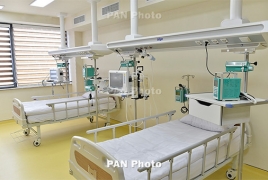Top global health challenges unveiled January 15, 2020 - 14:50 AMT PanARMENIAN.Net - The World Health Organization (WHO) has released its “to-do” list of the most urgent worldwide health issues that need to be tackled over the next decade. The heart of the issue, argues the WHO, is that governments are simply failing to fund health needs and health care systems. As a result, they are putting many people at the risk of death, poverty and of a national economic downturn, News Medical says. The issues involved are complex and often too thorny to handle with ease. However, they must be addressed, and they can be, too, if governments act with firm determination to invest in the health of their people. Healthcare spending is, according to WHO Director-General Tedros Adhanom Ghebreyesus, an investment in the future. While many national leaders gladly allot money to defend the nation against terrorism, for instance, a viral outbreak could cost many more lives, break the social bond that comprises society, and cost hundreds of millions of dollars to contain. For this reason, and because just one pandemic could cripple the nation financially, and break its independence, ensuring health security should not and cannot be a matter that is left to the ministries of health. There are so many issues that they cannot even be prioritized in terms of urgency – all are urgent, and many cannot be resolved in isolation. The 13 challenges identified by the WHO are diverse, covering climate change and air pollution, but also social and financial inequalities in health care. Unhealthy air is a global problem, with 7 million deaths each year due to polluted air, extreme weather, and worldwide droughts and famines. Climate change also causes malnutrition and increases the reach of infectious diseases like malaria by extending the habitat of the vectors. Pollutants cause the world to warm up but also precipitate one in four deaths due to cardiovascular disease, lung cancer and chronic lung disease. The haves vs the have-nots divide exists not only between rich and poor nations but also within the same nation. While rich populations enjoy a lifespan that is on average about 18 years longer than that of poorer nations, the level of health within even these rich nations is far from uniform. The WHO is eager to address these issues and make healthcare an equally accessible resource for all people. One of the WHO recommendations is that all countries spend 1% of their gross domestic product on fueling the establishment of a good primary health care system. This will help people to receive good care at the essential ground level where they most need it. Other WHO priorities include making medicines more widely available to groups that need them. Infectious disease control is an ongoing and urgent necessity, which requires action across the board, from mitigating the effects of climate change to encouraging clean environments and sustainable development goals that leave the earth clean. Another issue on the list is preventing human exposure to dangerous chemicals and other products that could cause chronic disease. Authorities said a total of 192 Azerbaijani troops were killed and 511 were wounded during Azerbaijan’s offensive. In 2023, the Azerbaijani government will increase the country’s defense budget by more than 1.1 billion manats ($650 million). The bill, published on Monday, is designed to "eliminate the shortcomings of an unreasonably broad interpretation of the key concept of "compatriot". The earthquake caused a temporary blackout, damaged many buildings and closed a number of rural roads. Partner news |